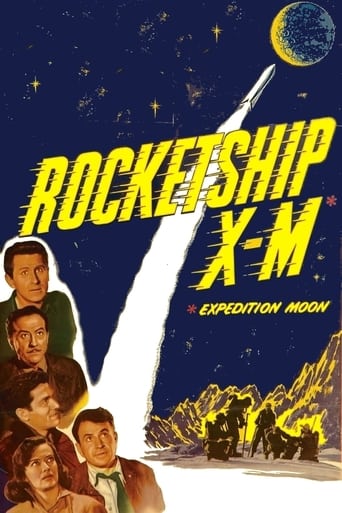LastingAware
The greatest movie ever!
Rio Hayward
All of these films share one commonality, that being a kind of emotional center that humanizes a cast of monsters.
Quiet Muffin
This movie tries so hard to be funny, yet it falls flat every time. Just another example of recycled ideas repackaged with women in an attempt to appeal to a certain audience.
Sarita Rafferty
There are moments that feel comical, some horrific, and some downright inspiring but the tonal shifts hardly matter as the end results come to a film that's perfect for this time.
coolantic
I saw this as part of a Saturday morning show in about 1959. For us kids it was simply a sci-fi adventure and a poor effort at that compared with Flash Gordon's Trip to Mars which we would enjoy an hour or so later. The first part, up to the take-off, was wordy and boring. However, once in motion things got better. I don't recall anyone having any issues about the ship being deflected to Mars; despite the x-million mile difference in the journey. We really got hooked when everything turned pink as they got there (special effects were a rare treat and very much appreciated).With surprisingly little protective clothing the astronauts investigate the cartoony ruins of a once-mighty civilisation (Forbidden Planet it ain't!).Any 'message' regarding the awful consequences of atomic war went straight past us 10 year-olds without stopping as the film entered more familiar territory. The frightened cave-girl screams, summoning a horde of spear-carrying regressed troglodytes, and our team legs it back to the rocket. Biggest surprise was when XM crashed killing everyone on board.Not even time for a reflective comment on how we're not as clever as we think we are! Incidentally, I obtained a DVD a few years ago and it appeared to be tinted green! Then I realised the scart wasn't properly plugged in! Got the message this time. But it isn't well done.
writers_reign
I've been reading some of the reviews here and am bemused by the number of times Destination Moon is mentioned as a rival product. In England the two films were shown as a double bill so by definition there was no rivalry as audiences were not asked to see one at the expense of the other. As to the film itself, seen today it's ludicrous and lacks credibility. The crew of the spaceship wear their ordinary clothes and are firmly anchored to the floor and free to move as they will without 'floating' i.e. no account is taken of the effects of gravity. Also conveniently ignored is how they eat, drink, and go to the toilet. Rather than a computer or even push buttons the ship is manoeuvred by levers that resemble the landing-gear controls of an airplane. Okay, maybe in 1950 audiences were happy to swallow all this but then is then and now is now.
MARIO GAUCI
This is one of the earliest films to emerge during the heyday of sci-fi cinema, anticipating even DESTINATION MOON (1950) – to which it pretty much was a rival (albeit more modest) production. It already features many of the ingredients that would become genre staples: the crew of the spacecraft is virtually a microcosm of post-war America (though two are actually foreigners – including the obligatory intellectual female, Osa Massen, whose icy exterior melts under the dogged attentions of rugged pilot Lloyd Bridges), their mission (whose details are meticulously spelled out during the opening Press Conference) apprehensively observed by Ground Control and, of course, the eventual glitch which jeopardizes the flight and sends our heroes to Mars (inhabited by cave-men, victims of a nuclear fall-out, no less!) instead of the Moon. Needless to say, the film feels quaint at this juncture if still eminently watchable: given the low-budget involved, the narrative is mostly restricted to the admittedly stylish shuttle interior – though the climactic exploration of Mars effectively takes place on desert locations and shot in evocative sepia. Incidentally, the last act proves surprisingly downbeat (emphasizing its intent as a cautionary tale – Dalton Trumbo reportedly contributed to the script!) and, yet, it is capped by a determined effort to keep the space race going despite the initial failure (a scene which, again, would soon be turned into a sci-fi cliché: see THE QUATERMASS XPERIMENT [1955]).
chuck-reilly
The pioneering 1950 sci-fi film "Rocket Ship X-M" was way ahead of its time in regards to its message and also in terms of serious dramatic content provided by an "outer space" movie. Considering the low budget (even for 1950) for this "B" movie, the cast is solid with Lloyd Bridges, Hugh O'Brien, Noah Beery Jr. and Osa Massen along for the ride. The plot seems simple enough; a spaceship lifts off for a mission to the moon with five astronauts aboard. During their flight, they encounter a severe meteor shower which violently pulls their craft out of its orbit and points them towards Mars instead. Of course, that scenario is slightly scientifically implausible in today's modern physics, but this is 1950 and anything's possible. After landing on the Red Planet, the astronauts discover the remnants of a technically advanced civilization that was far superior to anything ever developed back on Earth. The astronauts soon surmise that somehow the civilization destroyed itself, possibly by a nuclear war. What happens next is the crux of the film and lingers with viewers long after the final reel. There are survivors from Mars' past after all, but now they're nothing more than primitive cavemen. Frightened by these "intruders," they attack the astronauts and send them scurrying back to their ship. Dangerously low on fuel because of their long detoured journey to Mars, the astronauts blast off and attempt to return to Earth. But there's no happy ending for Rocket Ship X-M. This movie makes some obvious points about the Cold War atmosphere of the early 1950's and the constant threat of nuclear war. There's no question that the filmmakers wanted the audience to understand exactly how drastic things would change if something like that happened. Living as cavemen wouldn't be too far off the mark. Although this film has certainly dated since its release nearly sixty years ago, its message holds true today just the same as it did back in 1950. It wouldn't take much to send us all back to the Stone Age. So next time you vote for president...

